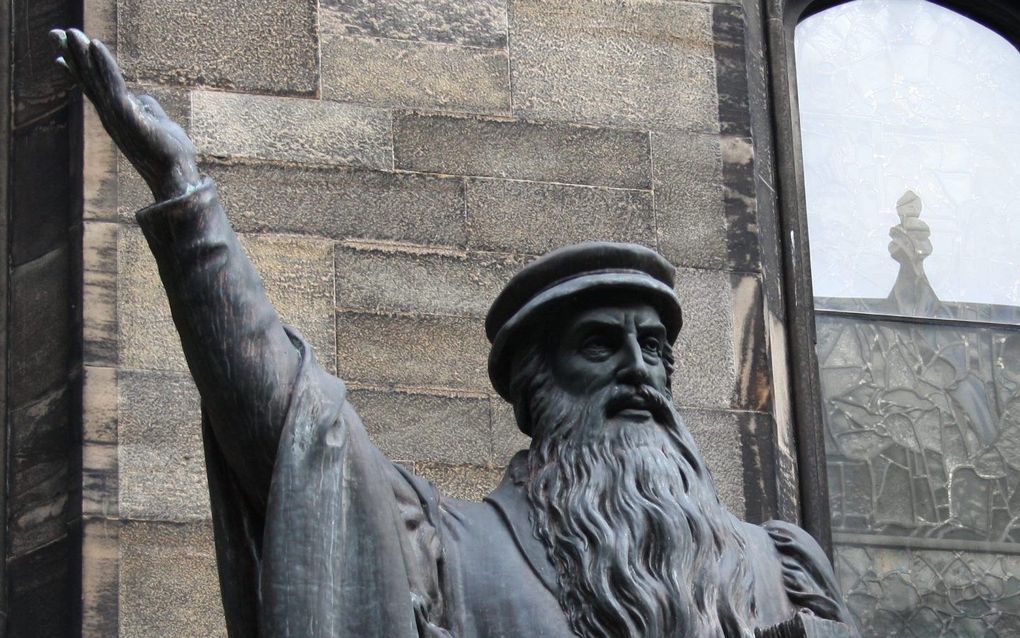All debates are ruled by humanistic thinking now
20-11-2021
Opinion
Laurens van der Tang, RD

John Knox stood firm against the spirit of his age. Statue of the Scottish Reformer in Edinburgh. Photo RD, Evert van Vlastuin
Opinion
Christians should become cross-thinkers again. They have to practice sustained and fierce spiritual warfare.
Slowly but surely, our society is getting totalitarian tendencies. Every Dutch person is warned to be vaccinated against Covid-19, on pain of discrimination. Every Dutch civilian is also expected to confirm fellow citizens in their choice of gender; otherwise, he risks criminal prosecution. Prof. Dr Andreas Kinneging even expects that, if there is no opposition or countermovement, the Bible will be a banned book in about ten years, and churches will be closed by the government, as was reported in the Reformatorisch Dagblad.
Two types of totalitarianism
There are two types of totalitarian societies. Dutch historian Bart-Jan Spruyt recently reminded of this when he wrote about hard and soft despotism. George Orwell described the first form in 1949, when he published his book "1984": a society in which brutal coercion is the means to achieve unity in behaviour.
The other form was outlined in 1932 by Aldous Huxley in "Brave New World". He describes a society in which gentle urge seduces people into conformity, with sex and drugs as widely available stimulants for young and old.
Well, the former Soviet Union was very similar to "1984". Western Europe nowadays tends more towards the 'delightful' world of Huxley.
Every totalitarian society combines elements of both forms of despotism. In the Roman Empire, the poor inhabitants of Rome were kept content with bread and circuses, while Christians were thrown before the lions. Adolf Hitler developed the Volkswagen with state money as a car for the common man, while Jews were exterminated. The Chinese government promotes prosperity for its population by boosting economic growth while at the same time strengthening its iron grip on citizens through a digital social credit system.
Many trends have a common cause
Why does the development towards a more totalitarian society seem to be inevitable? In this regard, the thoughts of the American pastor Dr Francis A. Schaeffer (1912-1984) are interesting. In "A Christian Manifesto" (1981), he wonders how it could happen that Christians responded with alarm to specific developments, such as the legalisation of abortion, the breakdown of the family and diminishing educational freedom, without noticing that all these developments are interrelated. And have a common cause.
Schaeffer concludes that, essentially, there are only two views of reality: the Christian and the humanist. Ultimately, these views are mutually exclusive. The Christian vision puts God at the centre and is based on an absolute morality from God's Word. The humanist vision puts people first. God does not exist. Everything is a matter of energy. Everything that happens is coincidental.
Because there is no longer a fixed benchmark for good and evil, morality is constantly adapted to changing worldviews. Ultimately, the humanist vision is a religion also, a faith. The humanist manifestos of 1933 and 1973 recognise this.
Schaeffer points out that the founders of the American Constitution assumed an absolute Christian morality. That was the spirit of the law. It was believed that any other worldview leads to tyranny. "If God does not rule us, tyrants will rule over us," said William Penn (1644-1718). In the Netherlands, Groen van Prinsterer (1801-1876) shared this concern. He envisioned a future in which the barbarism of mass culture would reign. This would only leave room for leave room for two options: anarchy (chaos) or dictatorship (tyranny).
Cross-thinkers
As in many other Western countries, humanistic thinking now dominates the Netherlands. Not only among politicians but also in the media, in science and culture, in the judicial institutions, in companies, in interest groups, in short, in all sections of society. For Christians, this means that they are engaged in an all-out battle.
In addition, one should take into account the satanic inspiration of humanism as a vision of reality. Christians fight against principalities, powers, rulers of this age and spiritual wickedness in the air (Ephesians 6:12); these are all indications of the devil and his henchmen. Any form of naivety in this is an underestimation of the opponent.
The consequence of all this is that all large and small social debates are dominated by humanistic thinking. All policies and regulations are coloured by it. Whether it's climate change, Covid-19, gender neutrality, social equality, racism, monetary policy or Europe: everything is ideological. Christians must be careful not to let themselves be uncritically guided by prevailing views on each of these topics.
They have to question themselves continually what the real issues are and the Biblical answers. The Biblical view will rarely correspond to the social consensus. Christians need to learn to be cross-thinkers again, even if it means being labelled as conspiracy theorists or extremists. They have to get used to constant and intense spiritual battles again. Not only against their own flesh but also against the world and the devil.
Kings should be under God's law also
A totalitarian humanitarian society also means that Christians face soft or hard forms of persecution. This raises the question of how far Christians should obey the government. Reformers like Calvin and Beza argued that civil disobedience could not only be a right but also a duty when one is forced to act against God's law. They also recognised the right to rebellion, albeit restricted to lower governments, which could then rebel against higher authorities.
The Scottish Reformer John Knox went further and recognised the right of revolt by citizens as a last resort. Samuel Rutherford elaborated on a more complete vision in his classic work "Lex Rex", in which he emphatically stated that kings too are under God's law. The book caused so much unrest that Rutherford would have been executed for high treason had he not died. However, his thoughts have lived on ever since and are reflected, for example, in the American Declaration of Independence.
Christians in 2021 would do well to delve into the ideas of men like John Knox and Samuel Rutherford. They were courageous cross-thinkers and cross-doers. They feared God and kept His commandments.
This article was published previously in the Dutch Reformatorisch Dagblad on August 28th, 2021
Related Articles






